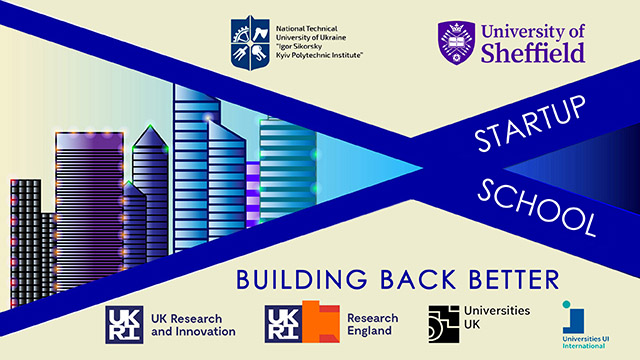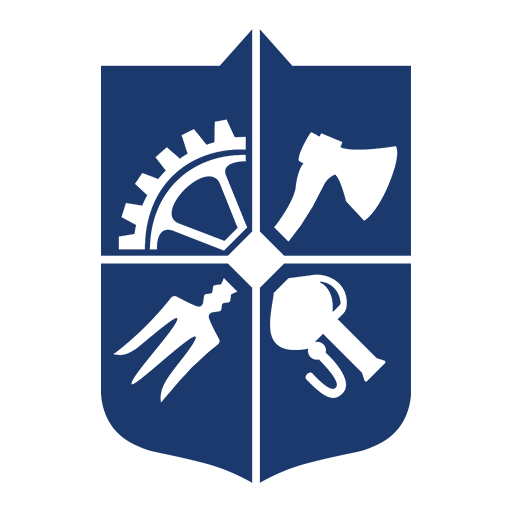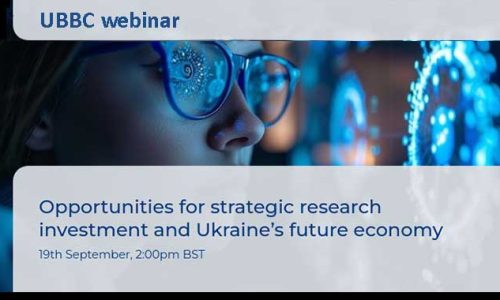
University of Sheffield to help Ukrainian start-ups

● University of Sheffield and Igor Sikorsky Kyiv Polytechnic Institute researchers have launched a new accelerator programme to give Ukrainian start-ups access to mentoring, training and funding opportunities they need to succeed
● Programme will help Ukraine restore its entrepreneurial ecosystem – a crucial step in helping the country recover from the war
● Building Back Better initiative will help Ukraine grow start-ups in areas key to recovery, such as infrastructure, industrial high technology, energy, engineering and health technologies.
A new accelerator programme to support Ukrainian start-ups and help restore the country’s entrepreneurial ecosystem – a crucial step in helping Ukraine recover from the war – has been launched this week (19 April 2023).
The Building Back Better initiative, co-designed by researchers from the University of Sheffield’s Management School and Igor Sikorsky Kyiv Polytechnic Institute (KPI), is providing Ukrainian start-ups with mentoring, training and access to the funding opportunities they need to succeed.
Researchers behind the programme believe that restoring Ukraine’s entrepreneurial ecosystem is crucial for helping the country recover from the war.
The initiative will help Ukraine grow start-up companies and drive innovation in areas that are key for recovery, such as infrastructure, industrial high technology, energy, engineering and health technologies.
The accelerator programme will include three stages; selection and training of start-ups with sessions in both English and Ukrainian, an incubation and mentoring phase and a final stage in which Ukrainian start-ups will visit Sheffield to pitch to investors.
Before the war, KPI, which is one Ukraine’s oldest, largest and most prestigious universities, was the driving force behind many successful startups and innovation programmes. Today, the University continues to support the development of new technologies and solve scientific problems in various fields.
heffield and KPI officially twinned last year as part of the #TwinForHope campaign, in which universities from across the UK twinned with their Ukrainian counterparts in response to the Russian invasion. Since then, the two institutions have started a wide range of teaching, research and practical initiatives to support KPI during the war. However, discussions between the two universities have identified post-war reconstruction as a key cooperation area.
Professor Vania Sena, Chair in Entrepreneurship and Enterprise at the University of Sheffield, said: “We at Sheffield are very delighted to be offered the opportunity to continue our collaboration with Kyiv Polytechnic Institute. The current project will play a vital role in supporting Ukraine during a critical moment of its history and builds on the two institutions’ track record in fostering entrepreneurship and new venture creation. We are looking forward to collaborating with the team from the Igor Sikorsky challenge and supporting the Ukrainian entrepreneurial ecosystem.”
Before the war, KPI had a strong track record in driving entrepreneurship and innovation. The institution was the initiator and coordinator of the All-Ukrainian Innovation Ecosystem – Sikorsky Challenge Ukraine (SCU) – which connects 25 universities from around the country, as well as 12 city-based and five regional innovation clusters.
The SCU platform is a virtual environment where different players of the Ukrainian entrepreneurial ecosystem can work together to support the creation of high-growth ventures in the country. KPI intends to develop the platform further and use it to deliver the accelerator programme that has been co-designed with the University of Sheffield.
Doctor Inna Maliukova, Head of the All-Ukrainian Innovation Ecosystem, Sikorsky Challenge Ukraine, said: “The main goal of SCU is innovation transformation and the post-war reconstruction of Ukraine. The University of Sheffield also pursues this goal and inspires fruitful cooperation. It is worth noting that during the project preparation when we compared our methodologies and educational programs, it turned out that they had a lot in common. It shows that we share similar views and have a common understanding of the goals and outcomes of this project.
“We are convinced that our cooperation will not end after this project but will provide the impetus for scaling and development. In the future, we will promote joint innovative projects. Furthermore, we hope that the University of Sheffield and jointly prepared projects will participate in our annual Sikorsky Challenge Innovation Festival. With effective collaboration, we will jointly prepare and lead startup project teams to success.”
Like KPI, the University of Sheffield has an excellent track record of translational research. Sheffield operates a high quality commercialisation process, which underpinned the successful capitalisation of Northern Gritstone – a new venture capital company established to boost the commercialisation of university spin-outs and start-ups in the north of England.
The University of Sheffield has one of the largest IP-licence incomes of any UK-based University and the latest Knowledge Exchange Framework – an assessment of how English universities work with businesses and external partners – placed Sheffield in the top 20 per cent of Universities for IP and commercialisation.
Sheffield is an active participant of the Enactus programme, a global scheme offering students the opportunity to hone their entrepreneurial skills. The University runs an Entrepreneurs in Residence scheme where entrepreneurs work with staff and students to commercialise their research. Finally, Sheffield was ranked the top city to start a business in 2022, according to the Start-up Cities Index.
Ends
Media contact: Sean Barton, Media and PR Officer at the University of Sheffield, 07808 890095 or s.barton@sheffield.ac.uk
The University of Sheffield
The University of Sheffield is a leading Russell Group university, with a world-class reputation. Over 30,000 students from 150 countries study at Sheffield. In a truly global community, they learn alongside over 1,500 of the world’s leading academics.
Sheffield’s world-shaping research feeds into its excellent education. Students learn at the leading edge of discovery from researchers who are tackling today’s biggest global challenges.
Driven by outstanding people, staff and students share a commitment to changing the world for the better, through the power and application of ideas and knowledge.
From the first documented use of penicillin as a therapy in 1930, to building Europe’s largest research-led manufacturing cluster, Sheffield’s inventive spirit and top quality research environment sets it apart.
Current research partners include Boeing, Rolls-Royce, Unilever, AstraZeneca, GlaxoSmithKline, Siemens and Airbus, as well as many government agencies and charitable foundations.
Sheffield’s Students’ Union has won the Whatuni Student Choice Award for Best Students’ Union for five consecutive years. Students can choose from 350 societies and clubs, or join over 2,000 volunteers.
Over 300,000 Sheffield alumni from 205 different countries make a significant influence across the world, with six Nobel Prize winners included amongst former staff and students.
To find out more, visit: www.sheffield.ac.uk
Contact persons:
Liudmyla Rusina, Coordinator of the Sikorsky Challenge International Projects
e-mail: li_rus@ukr.net
Serhii Serhienko, Coordinator of the Sikorsky Challenge Startup School
e-mail: s.serhiienko@hotmail.com
Telegram: https://t.me/Serhii_Serhiienko






